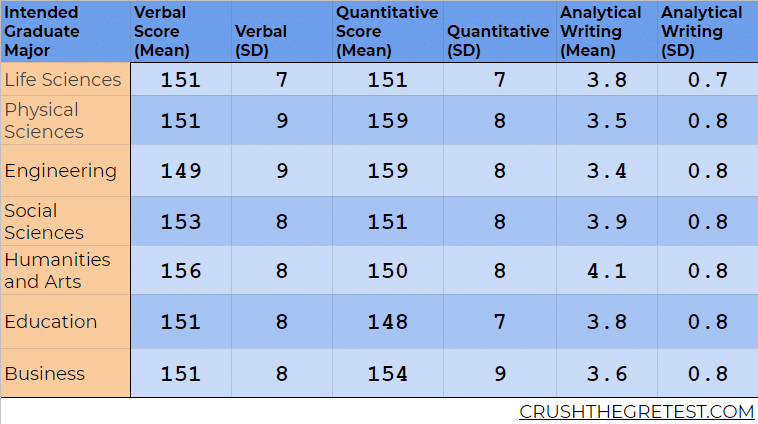
GRE stands for the Graduate Record Examinations, and refers to a 3-part standardized test created by the ETS, or the Educational Testing Service. The GRE is an integral part of the graduate school application process used by hundreds of programs around the country.
The 3 sections of the GRE examine your verbal reasoning, quantitative reasoning, and writing abilities, providing grad schools with an overall view of your academic ability. Whether you’re still considering applying to grad school, are well on your way to taking the exam, or are anxiously waiting for your GRE results, gaining a deeper understanding of GRE scores and structure can be a vital next step toward your academic and professional goals.
How Is the GRE Scored?
The GRE exam, or GRE General Test, as it is sometimes called, can be taken either online or on paper. Each format includes the same 3 sections, otherwise referred to as ‘measures’:
- Quantitative Reasoning
- Verbal Reasoning
- Analytical Writing
If you’re trying to decide whether to take the paper-and-pencil or computerized version of the GRE, you should be aware that the computerized version of the GRE is section-adaptive. This means that while you are taking the Quantitative Reasoning and Verbal Reasoning measures, the sections of questions within those measures will change depending on your performance. If you answer more questions correctly in the first section of the Verbal Reasoning measure, for example, the second section may be more difficult.
If you’re taking the computerized version, then it’s a good idea to go back and check your answers carefully in the first section of each measure. The test makes it easy, as the computerized GRE includes ‘mark’ and ‘review’ features to help you note questions that you need to come back to. Just make sure that you maximize your opportunity to do well in each section, because it certainly impacts the rest of your testing experience.
No matter the format of the test that you take, the scores and scoring increments of the measures are always the same.
GRE Score Table
| Section | Score |
| Verbal Reasoning | 130-170 points, 1-point increments |
| Quantitative Reasoning | 130-170 points, 1-point increments |
| Analytical Writing | 0-6 points, 0.5-point increments |
Though it’s been a while since then, you should be aware that the GRE was revised in 2011, which included revisions to its scoring system. For GRE exams taken prior to August 1, 2011, the Verbal and Quantitative sections of the exam were both scored from 200-800 in 10-point increments, and from 0-6 in half-point increments for the Analytical Writing portion of the exam. You may see those numbers thrown around online, so it’s important to remember the current scoring system for the GRE:
The Verbal and Quantitative Reasoning sections are now scored between 130-170 in 1-point increments, so 170 is the highest possible GRE score for the individual Verbal and Quantitative Reasoning measures. The Analytical Writing GRE score range has not changed, and is scored between 0-6 in half-point increments.
What is a Good GRE Score?
While many GRE scores are undoubtedly better than others, it’s not easy (or all that helpful) to say whether a GRE score is outright ‘good’ or ‘bad.’ Instead, everyone taking the GRE needs to identify their personal and professional goals and base a target score off of that. This takes some research, as test-takers who want to get into a good graduate school will need to identify their target programs, investigate their average GRE scores, and create a well-rounded application to complement their goals.
There are so many different factors that go into your graduate school application, and the GRE is just one of them. Though the GRE is a tremendously important part of the application process, test-takers can’t let themselves get too caught up on getting 170s and 6s on their GRE measures, as these goals are incredibly difficult to reach. Determining a good GRE score for you, then, definitely requires looking into the scoring standards of specific institutions.
Though telling you what a ‘good’ GRE score is can be problematic, we can at least inform you about some GRE averages. According to the ETS, the mean scores for the GRE’s Verbal and Quantitative sections are 150 and 153, respectively. The mean score for the GRE’s Analytical Writing section is 3.55.*
*Source: ETS Score Report, 2018- 2024
So, if you want a good GRE score that’s a bit higher than the average, aim for a total score above 306.
On top of national and school-based average scores, you should be aware that some graduate programs have cutoff scores for the GRE. That means that, if the total GRE score you send them doesn’t meet a specific number, they won’t even look at your application. We’ll dive into this topic of cutoff scores later.
Depending on the graduate program you’re applying to, you should also be aware that some departments weigh different measures of the GRE differently. Some departments, such as those in the humanities, for instance, may care more about the Analytical Writing and Verbal Reasoning scores. Even then, don’t forget that most programs look at GRE scores as only one element of your application package, which generally includes several different elements. If you have a well-balanced, solid application, you may not need to worry as much about having a good GRE score to get into your ideal grad program.
Other factors considered in graduate school applications include:
- Undergraduate GPA
- Professional resume
- Statement of purpose
- Letters of recommendation
So, it’s clear that determining a good GRE score is no easy process. Achieving that score, on the other hand, is a totally different can of worms. Below, we guide you through the best course of action you can take as you prepare for the test; in our experience, following these steps to set, prepare for, and achieve a good score on your exam is the most sure-fire way to crush the GRE.
7 Steps to Getting a Good GRE Score
1. Determine the top 3 schools/programs that you’d like to get into

Instead of approaching the GRE hoping to get scores that compare to a national average, identify the specific programs that you know you want to apply to. Each school, and even programs in that school, will likely have different standards for acceptable GRE scores. This step also provides a great opportunity to set a firm plan of action for your future career, as each program will have different things to contribute to your professional experience.
2. Find the average scores of applicants to those programs
Many grad schools will provide you with both the GRE cutoff scores for their programs, and the average GRE score of applicants who have successfully been admitted into the program. These averages will give you a better idea of what your ideal institution sees as their standard GRE score, and will provide a foundation for you as you prepare for the GRE.
3. Register for the GRE test
Once you know the programs and scores you are aiming for, it’s time to register for the test! Make sure you choose a day for your GRE test that will not interfere with your other obligations, and be sure to give yourself plenty of time to prepare. If you’ve just graduated from your undergrad program, 1-3 months is likely enough prep time for the GRE. If you’ve been out of school for a while, keep in mind that you may need a little more time to get up to speed and refresh your memory on important concepts. So, if you’ve been out of school and in the professional world for a decent amount of time, you should take 6 months to prepare for the GRE. An important note: if you’re taking the paper version of the GRE, you select the schools (up to 4) that will receive your GRE scores when you register for the test. You can learn more about how to register for the GRE on ETS’s registration page.
4. Prepare for the GRE test

So, you’ve registered, but how exactly do you start preparing for the GRE? There are plenty of basic resources available to you online, plus more premium resources that are far more likely to give your score the boost you may need. ETS, for example, offers online sample questions to help you practice. For many students, though, studying on your own just isn’t enough, and a lack of structure and formal guidance can leave you feeling dead in the water during test prep. If you find yourself in that position, investing in a GRE test prep program could save you a lot of time and frustration in the long run. GRE test prep programs and software are created by standardized testing professionals to help you study in the most effective and efficient way possible. That way, you can focus on what’s most important–crushing the GRE. There are plenty of test prep programs out there, each with its own price and teaching style. If you’re interested in a GRE prep program but don’t know where to start, check out our list of the best GRE prep courses to find out which will best fit your individual needs.
5. Take the GRE test
So, you’ve made it to the big day. Now, all you need to do to succeed on the GRE is make sure you’re well-rested and well-fed. It would be a good idea to arrive at the testing center a little early, so you can make yourself comfortable at the testing center before your test begins. If you’re taking the computerized version of the GRE, note that you’ll designate up to 4 schools that you want to receive your scores while you’re at the testing center. Eliminate distractions, keep your cool, and feel proud of your performance once you’ve made it to the other side.
6. Submit your GRE scores
After you take the GRE test, it takes between 10-15 days for you and your schools to get your official score reports. Registering for the GRE allows you to send up to 4 score reports, but you can request additional reports for $27 each. While you’re waiting for the score reports, you don’t have to wait to put the rest of your application together. This would be a great time to prepare the other portions of your graduate school applications. After all, there’s a lot more to you than just a test score.
7. Revise / Replan / Retake
If you are pleased with your performance, then good job, your application process is complete! If not, you still have the opportunity to retake the GRE. Evaluate what you’d like to improve about your GRE scores, revise your test-prep strategy, and take the test on again with confidence.
Taking the GRE won’t be the same for everyone, but following these general steps provides you with a solid structure for the test-taking process. Every structure, of course, needs a good foundation—that’s why you should start the test-prep process by setting a good target score.
Setting a Target GRE Score
Average GRE Scores by School

The first step toward success on the GRE, of course, is setting a goal for your GRE performance. Research is a key part of this step. The GRE is accepted by hundreds of schools and programs in a large variety of disciplines (the Arts, Social Sciences, Natural Sciences, Engineering, Business, Foreign Languages, etc.), so it’s difficult to give a general answer about what GRE score will get you into a particular program.
Again, schools often weigh the individual GRE measures differently. Many programs in the humanities are less concerned with your performance on the Quantitative section of the exam, whereas engineering departments likely care more about that section’s scores. That said, the better your score on the GRE overall, the more options you will have when it comes to graduate school admissions.
In general, top schools (like Harvard, Yale, Princeton, Stanford, etc.) prefer candidates who score in the 80th percentile or above on either the Verbal or the Quant section of the exam, depending on the type of graduate program. Percentiles are a way of comparing your scores to the rest of those who took the test. Basically, if you’re in the 80th percentile, it means that you did better than 80% of people who took the test. In other words, congrats, you’re in the top 20% of test-takers!
Your best bet is to research the programs that interest you most to find out the typical GRE score ranges of admitted students.
Just so you can get an idea of what average scores for a top program look like, here are Stanford’s average GRE scores for 2019:
In 2019, the average GRE Verbal Reasoning and Quantitative Reasoning scores for students admitted to Stanford’s business school was 165. The average GRE Analytical Writing scores for students accepted to Stanford business was 4.9.
But don’t let these scores intimidate you! Scores like that are incredibly difficult to achieve, and much lower scores can still get you into quality programs. Additionally, don’t forget that those scores were for a specific program at Stanford, rather than the school as a whole.
Just like different schools have different score requirements, the different academic programs in a school have different GRE score requirements. Be sure to find the average score for your chosen graduate program, as each specific program will have different needs and standards.
Average GRE Score by Program
Graduate schools usually post the average GRE score of their incoming class every year, so it shouldn’t be too difficult to find out how successful applicants at your dream school did on the GRE. If you’re having trouble finding the average score for a specific school, check out graduate student forums online, or check out the authoritative U.S. News & World Report. They post rankings of the best graduate schools along with their GRE score ranges. If none of this is helping you out, don’t be afraid to just pick up the phone and give your school’s admissions office a call! Developing a more personal relationship with the admissions team can be a great move during the application process.
Below are a few average GRE scores, showing the mean and standard deviations on each GRE measure for different graduate fields:

*Source: ETS Score Report
In general, if you plan on attending a school that isn’t highly competitive, and your scores are above the school’s average scores, your application is in good shape. At a highly competitive school, your scores will likely need to be higher than average in order to make your application stand out from the rest of the pack.
You should also remember that having an excellent (or even perfect) GRE score is no guarantee that you will be admitted to a particular program. Graduate school admissions committees in the U.S. tend to look at a student’s entire application, and may place as much emphasis on your GPA, your letters of recommendation, and your personal statement as they do on your GRE scores.
The GRE Guru Blog does a great job breaking down GRE requirements by university, so you can identify specific schools to aim for that are in your target GRE score range.
How Important are GRE Cutoff Scores?

Discovering the average scores for your desired school is a great start, but your school’s cutoff scores are another important number to be aware of.
Cutoff scores are not a signal for what a ‘good’ GRE score is, but are rather the lowest possible score that the program will accept.
If your score doesn’t meet a school’s cutoff, it means that the graduate school’s admission committee will immediately toss out your application, no questions asked. Universities use GRE cutoff scores as a convenient way to weed out low-level candidates that they would likely not consider for admission anyway. These cutoff scores are generally very low. But just to be sure, you should still put in some research to find out the bare minimum score that your school will consider.
Ideally, those cutoff scores will be located on the web page of your chosen program, included in their admissions requirements. If they don’t make this GRE score available online, then your best option may be to call up the admissions office directly. In case you’d like a better idea of what cutoff scores look like for highly competitive programs, we’ve compiled a list of top programs’ GRE cutoff scores in the graphic to the right.
How to Prepare for the GRE
GRE Study Materials and Resources
There’s no question that tackling the GRE is a daunting task. At times, something as significant as the GRE can even seem overwhelming. Where do you even start? Unfortunately, there is no quick fix to instantly prepare you for the exam. Gearing up for the GRE in a way that is both meaningful and manageable can take up to 6 months, and finding the most efficient test-prep methods for you can be a daunting task in and of itself!
Fortunately, there are a number of products on the market that take the guesswork out of studying for the GRE. Professionally-designed GRE prep courses can help you use your time in the most efficient way possible, but of course, products like these do come at a price.
GRE Prep Courses
Different GRE review programs will work for different people, as everyone has a different learning style. If you’re interested in a more formal test-prep experience, but don’t know where to start, you should check out our list of the top GRE review courses like Princeton Review GRE or Achievable GRE to find the right one for you. Most GRE prep courses have a free trial available if you’re unsure about which program you might like. If you know what program you want to go with, but are worried about breaking the bank, we’ve also got some exclusive GRE discounts that you might be interested in.

Once you’ve found a studying strategy that works for you, whether it’s a formal GRE prep-course or a self-designed study program. it’s important to really stick with it. This can be difficult, as the best study habits require daily dedication. You can learn more and improve your GRE score by a wider margin if you set aside a little bit of time each day so that you can practice in short spurts, rather than trying to cram it all in at once. GRE courses can help you stick to a studying schedule, but don’t forget that using a course won’t guarantee the perfect GRE score. Like anything in life, you will only get out of the test prep program what you put into it in terms of time and effort.
GRE Score Calculator
As you practice and prepare for the test, you can use a GRE calculator or a GRE/GMAT admissions calculator (readily available online) to determine the minimum GPA and GRE scores you will need to get into a particular program. In addition, many GRE prep courses include practice tests and GRE score predictors that can give you an idea of where you’re at in comparison to your GRE score goals.
GRE to GMAT Conversion
If you are applying to business school, you may be wondering whether you should take the GRE or the GMAT. The GMAT is another widely used standardized test that many MBA programs use in their admissions process, so those applying for business school should definitely research the differences between these tests. We’ve put together an article that details the specific differences between the GMAT and the GRE, so you can compare the advantages and disadvantages of each option.
You also may be interested in a GRE to GMAT conversion tool, another resource that can help you navigate the business school admissions process. Use this tool to determine what your GMAT score would be using your GRE scores. Keep in mind that these are very different tests, and many students naturally do better on one exam rather than the other, so no conversion will be exact.
ETS provides a version of this tool, called the GRE Comparison Tool for Business Schools, which is specifically designed to help schools predict applicants’ potential GMAT scores based on their GRE Verbal Reasoning and Quantitative Reasoning scores. Do note that ETS provides a predicted GRE score range instead of specific scores, precisely because of the differences in how the tests are designed.
If these resources still aren’t helping you decide whether to pick the GRE or GMAT, or if you’re having trouble in general navigating the complex world of MBA programs, consider using an MBA admissions consultant who can help you find your way.
Understanding Your GRE Scores
When Do I Find Out My GRE Score?
If you take the computerized GRE, you will immediately see your unofficial GRE score report for the Verbal and Quantitative sections after you complete the exam. The Analytical Writing score still must be graded by hand, so it won’t be available the same day.
About 10-15 days after your test date, ETS submits your official Graduate Institution Score Reports to the recipients you selected before you took the exam. An email from ETS will also notify you that your official scores have been posted to your ETS account, and that your scores were sent. If you take the paper version of the GRE, your scores will be available within 5 weeks after you sit for the test.
GRE Score Percentiles Breakdown
Specifically, score percentiles show the percentage of GRE test takers who scored lower than a specific score. GRE score percentiles are printed on your score report so that you (and graduate schools) can easily see how well you did in comparison to all other test takers. For example, if you got a scaled score of 163 for the Verbal section of the GRE, that’s equivalent to a score percentile of 92. Being in the 92nd percentile means that 92% of all test takers scored lower than you for the Verbal portion of the exam (and that you did really well).
Below, we break down how the 90th and 80th percentiles equate to current GRE scores.
2015-2018 GRE Percentile Scores by Section*
| GRE SECTION | 90th Percentile Score | 80th Percentile Score |
| Verbal Score | 162/170 | 158-161 |
| Quantitative Score | 167/170 | 162-165 |
| Analytical Writing Score | 5.0/6.0 | ~4.5/6.0 |
*Source: ETS Score Report
80th and 90th percentile scores are very competitive, but scores above the 50th percentile can still get you into good graduate programs:
| GRE SECTION | 50th Percentile Score |
| Verbal Score | ~151/170 |
| Quantitative Score | ~153/170 |
| Analytical Writing Score | ~4.0/6.0 |
What if I Get a Bad GRE Score?
As the test approaches, it’s natural to wonder what would happen if you missed your ideal GRE score. The most important thing for you to remember, though, is that even if your first attempt at the GRE didn’t reach your expectations, you’re in good company! The GRE is a difficult test, and there are a few options for you in terms of your next steps.
- Take the GRE again.
You can always take the test again. Many test prep programs, such as those from Kaplan, The Economist, and Target Test Prep, offer a guaranteed score increase to those who have already taken the GRE So, if your score doesn’t improve even after you’ve completed the course, these programs refund your money in full. - Polish your grad school application.
If your GRE score was just shy of where you wanted to be, you may still be in good shape. You can focus on making the rest of your graduate school application really shine by improving your resume, revising your statement of purpose, and seeking out excellent recommendation letters. Look for those things that will make you stand out so that your test scores are really a non-issue. Graduate schools lend more gravity to these other parts of your application than your undergrad program likely did, so use this as an opportunity to showcase your positive attributes and show what you will add to a grad program. If you’re really not sure whether your application is ready to go, you could invest in a graduate program admissions counselor who can give your application a second pair of eyes. Our list of the Best MBA Admissions Consultants compares some options that might be right for you.
If you learn anything from this article, we hope you learn that the GRE is a formidable task, but one that you can handle with the right preparation. Take a specific, measured approach to your GRE prep, and use reasonable goals to hone your test-taking skills and polish your graduate application.
Hopefully, we’ve helped you understand how to best set and achieve your GRE goals, but we’d love to hear from you! What questions do you have? How did you determine your target GRE score? What tips and tricks do you have about taking the GRE? Let us know in the comments section below.
COMPARE THE BEST GRE PREP COURSES!
Bryce Welker is an active speaker, blogger, and regular contributor to Forbes, Inc.com, and Business.com where he shares his knowledge to help others boost their careers. Bryce is the founder of more than 20 test prep websites that help students and professionals pass their certification exams.




